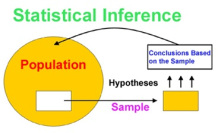En gigant har gått ur tiden .[embedded content] Peps Persson 1946-2021.
Read More »L’Afrique du Sud — le pays le plus inégalitaire au monde
L’Afrique du Sud — le pays le plus inégalitaire au monde .[embedded content]
Read More »Testing causal claims
.[embedded content]
Read More »What does randomisation guarantee? Nothing!
What does randomisation guarantee? Nothing! Does not randomization somehow or other guarantee (or perhaps, much more plausibly, provide the nearest thing that we can have to a guarantee) that any possible links to … outcome, aside from the link to treatment …, are broken? Although he does not explicitly make this claim, and although there are issues about how well it sits with his own technical programme, this seems to me the only way in which Pearl...
Read More »‘New Keynesian’ macroeconomics — worse than useless
‘New Keynesian’ macroeconomics — worse than useless Mainstream macroeconomics can only progress if it gets rid of the DSGE albatross around its neck. It is better to do it now than to wait for another 20 years because the question is not whether but when DSGE modeling will be discarded. DSGE modeling is a story of a death foretold … Getting rid of DSGE models is critical because the hegemonic DSGE program is crowding out alternative macro methodologies...
Read More »Economics — a science in need of a paradigm shift
Economics — a science in need of a paradigm shift The methodology and ideology of modern economics are built into the frameworks of educational methods, and absorbed by students without any explicit discussion. In particular, the logical positivist philosophy is a deadly poison which I ingested during my Ph.D. training at the Economics Department in Stanford in the late 1970s. It took me years and years to undo these effects … Modern economics is much like...
Read More »Orban’s Hungary — a shame for all of Europe
Orban’s Hungary — a shame for all of Europe .[embedded content]
Read More »Why the idea of causation cannot be a purely statistical one
Why the idea of causation cannot be a purely statistical one If contributions made by statisticians to the understanding of causation are to be taken over with advantage in any specific field of inquiry, then what is crucial is that the right relationship should exist between statistical and subject-matter concerns … Where the ultimate aim of research is not prediction per se but rather causal explanation, an idea of causation that is expressed in terms of...
Read More »In support of professor Mas-Colell
In support of professor Mas-Colell Estamos profundamente preocupados por las noticias y la situación del profesor Andreu Mas-Colell, uno de los economistas españoles más conocidos y respetados, en el actual procedimiento del Tribunal de Cuentas. El profesor Mas-Colell ha sido catedrático de Economía Louis Berkman en la Universidad de Harvard, editor de Econometrica (una de las principales revistas científicas de economía) y secretario general del Consejo...
Read More »What is money? (II)
What is money? (II) Currently the credit theory dominates monetary theorizing and policy debate. So, policy analyses implicitly make assumptions about money as if its properties qua money were those of a form of debt credit. Currently prominent examples include Minsky as well as proponents of Modern Money Theory (MMT). Hyman Minsky, who has been as infl uential as any money theorist in recent times, coined in passing, in a substantive piece, the familiar...
Read More » Lars P. Syll
Lars P. Syll





